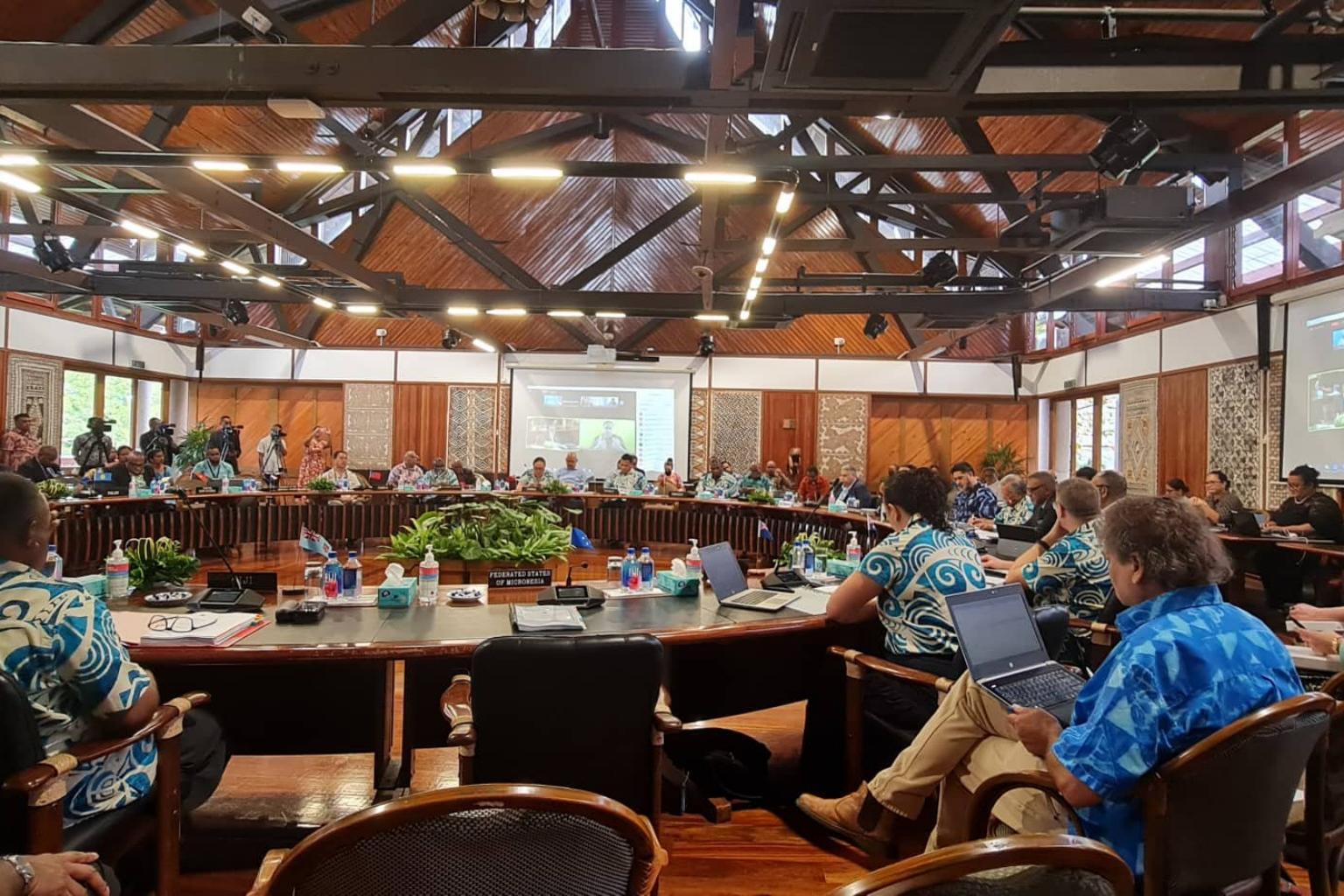Kiribati's shock withdrawal overshadows Pacific leaders meeting
Sign up now: Get insights on Asia's fast-moving developments

Delegates meeting at the Pacific Islands Forum on July 8, 2022. Kiribati withdrew from the group on July 11, 2022.
PHOTO: PACIFIC ISLANDS FORUM/FACEBOOK
Follow topic:
SUVA, FIJI (REUTERS, BLOOMBERG) - Tensions between China and the United States, and the withdrawal of the remote Pacific island nation of Kiribati, have overshadowed the Pacific Islands Forum as leaders arrived in Fiji on Monday (July 11) for the first in-person summit in three years.
During the four-day meeting, Pacific island leaders will discuss how to gather more international support and funding to fight the impact of rising sea levels and climate change, as well as China’s ambitions for greater security ties across the region.
A bid by Beijing to sign a broader regional trade and security deal with 10 nations that recognise China, but is opposed by some forum members, was also to be discussed.
Tuvalu Foreign Minister Simon Kofe said he was saddened by the news of Kiribati's withdrawal and Pacific leaders would need to "look at the concerns raised by Kiribati" when they meet this week.
Kiribati President Taneti Maamau said in a letter his country would withdraw from the forum because it did not agree with terms of a deal brokered weeks ago to solve a rift between Micronesian states and other members, and wanted the meeting delayed.
New Zealand’s Prime Minister Jacinda Ardern said Kiribati’s withdrawal was “disappointing”, while Australia pledged A$2 million to assist Kiribati with drinking water amid a severe drought – an impact of climate change.
Also being discussed by Pacific leaders is fisheries – tuna is a major source of revenue in the region – but the issue also risks being caught up in geopolitical tensions, Kofe said.
China operates a large fishing fleet in the Pacific and is seeking greater access to one of the world’s richest fishing grounds.
The Quad group of the United States, Japan, Australia and India have offered Pacific islands increased surveillance to stop illegal fishing in exclusive economic zones.
“This geopolitical competition will continue and it is important the Pacific focuses on the issues that are critical to the Pacific – climate change and the conservation of our resources,” Kofe said.
The United States wants to expand a fisheries treaty in the Pacific to cover “other security issues”, he said, and this would be discussed at the forum.
Tuvalu is among four Pacific nations that have diplomatic ties with Taiwan and not Beijing.
Kofe withdrew from a recent UN Ocean conference in Lisbon after China barred the presence of Taiwanese members included in the Tuvalu delegation. He said this was “bully tactics” by China.
Nonetheless, Kofe said Tuvalu doesn’t want differences between China and Taiwan to distract Pacific islands from what unifies all nations in the region this week.
“Maintaining the unity and solidarity of the Pacific family is critical for us to be able to navigate many of these issues that we are facing,” he said.
New Zealand's Prime Minister Jacinda Ardern will be attending the meeting, which comes days after the head of state called for more regional co-operation to counter China.
Ardern will go to Fiji from Tuesday to Thursday where she plans to make announcements on climate and aid projects, her office said in a statement.
The summit marks the first time leaders of the nations involved have met since 2019, and comes after Ardern used a trip to neighbouring Australia just last week to call for more regional diplomacy as a means to contain what she has previously described as China's increasing willingness to challenge international rules and norms.
"This meeting comes at a critical time for the Pacific, with the region facing climate, environmental, governance, and human development challenges, as well as sharpening geostrategic competition," Ardern said, calling the forum "the primary vehicle for addressing these challenges".
The forum will work on a 2050 strategy plan that will aim to outline collective priorities for the region, her office said.
"The Pacific is our foreign policy priority, with a strategy of building Pacific resilience," Ardern said. "To achieve this we've lifted our support to the region by 45% over the past three years."

